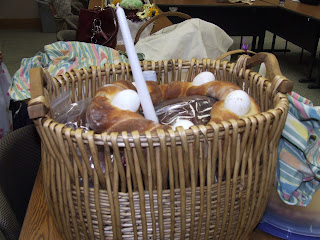 I've been mulling this over for quite some time now. Philip has reached a point where he is too high-functioning to realize how low functioning he is and it is radically affecting every area of life. As a 10 year old with the IQ of a 6 year old and the social IQ of a 4 or 5 year old, he *thinks* he's rolling along just fine with his peer group. His autism makes him too self-absorbed to understand that others are not relating to him in the way he thinks they are. This is just fine for him I guess but not so good for the rest of us who need to walk alongside him and help him navigate life a bit more successfully. For many of us, it has become a great frustration.
I've been mulling this over for quite some time now. Philip has reached a point where he is too high-functioning to realize how low functioning he is and it is radically affecting every area of life. As a 10 year old with the IQ of a 6 year old and the social IQ of a 4 or 5 year old, he *thinks* he's rolling along just fine with his peer group. His autism makes him too self-absorbed to understand that others are not relating to him in the way he thinks they are. This is just fine for him I guess but not so good for the rest of us who need to walk alongside him and help him navigate life a bit more successfully. For many of us, it has become a great frustration. The jagged edges around the circle that is Philip's World are an indication of the prickliness we experience when we attempt to help him break outside of his circle to meet his wants. He *wants* to have friends, freedoms, responsibilities but he just isn't able to because all of that prickly jagged edge keeps him from making good decisions. Within that jagged edge are characteristics such as "unteachable", "impulsive", "argumentative", "childish", "rigid thinking" and the very practical limitation of his poor speech and language skills.
My job, as I see it, is to provide him with as many bridges as possible to guide him over that prickly outside edge. Ben has been helping me process this and he's had some great insights. He realized, for example, that one bridge he uses for Philip is to present completely novel ideas to him. If Philip has already encountered an idea, he will immediately grow a rigid insistence to keeping it the same no matter what. But Ben has found that if he, say, presents to Philip the rules of a game he has never played before, then Philip will be able to follow the rules and enjoy the game without arguing with others. This bridge, unfortunately, goes both ways back into Philip's World, however, once the rules have been established in Philip's mind and the game is no longer novel.
On Monday I met with Philip's pediatrician to discuss the use of medications as a possible bridge. We will be playing around with Adderall for a while and see if the breaking down of his impulsivity will help to create a bridge toward better decision making which would result in greater freedoms and more responsibility. We are both skeptical, however, at the effectiveness of this since there are so many factors at play here. The autism and mental retardation cannot be cured with medication. I am fortunate (greatly blessed, actually) to have a pediatrician who is willing to walk alongside me on this with completely open lines of communication.
The Specific Carbohydrate Diet has provided a very important bridge for him. With this diet, we control many of his stereotypical/perseverative behaviors as well as his more OCD type behaviors. Helping him improve his speech and language skills is also in the works with the purchase of some software he's been using to help with his speech and I've kicked around the idea of voice lessons as well, using his natural talent for near-perfect pitch, and an outside teacher with whom he won't argue, to help him re-train his lips and tongue to make speech sounds more effectively.
I have a feeling identifying the things through which he filters his thoughts is also an important part of this puzzle. He basically has five different filters that we've identified: Screens (computer, tv, etc), Movies (he often communicates in dialogue from movies), NASCAR, Food and Self-Interest (Ben very astutely identified this filter for me). I think we may find many small footbridges within these filters. If we present information to him through these filters, he may be better able to make limited crossings into the worlds of Family and Others. For example, he is able to relate well with humor to the rest of the family when we are all engaged in recalling a movie we have seen together. An effective and enjoyable activity is for the children to recite lines from movies together with each person taking on a different character. I never made it all the way through the RDI manual before I lost it in the fire but I suspect that some variation on this idea of filters plays a part in the success of that program.
Parenting Philip has never been an easy task and this is just one more step in my on-going attempt to relate to him and guide him closer to leading a productive and fulfilling life.













